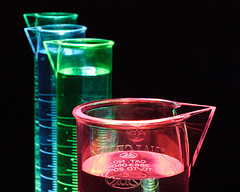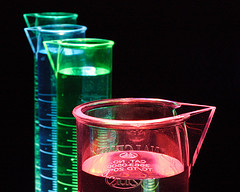Fine Tuning Your Swimming Pool Chemistry

Swimming pools can be attractive and can add value to your home. A properly installed pool looks beautiful at first, but poor maintenance can erase all the good looks. It’s a waste of money to set up a swimming pool and just let it go murky. Regular maintenance may be irksome but one-time and major cleanup can be even more annoying. Pool maintenance is possible with general checkup and cleaning, both requiring use of swimming pool equipment.
One of the tricky things about maintenance is checking the water chemistry. Note that while the pool filtration system does much of the work in maintaining good water condition, tweaking the water chemistry is the key to making your pool suitable. Chemical balance of the water is important to keep the growth of microorganisms and the production of harmful chemicals. Certain water conditions favor proliferation of bacteria and other pathogens. At the same time, poor water chemistry can also be a sign of inadequate filtration and chlorination systems.
There are signs that indicate poor water chemistry—cloudy water, discoloration, and chlorine smell. If you suffer from skin and eye irritation after swimming, your pool’s chemistry should be checked.
Eliminate the pathogenic agents.
Chlorine is the most popular disinfecting agent. Although chlorine gas may be used, commercial pool disinfecting agents are in form of calcium hypochlorite or sodium hypochlorite, the same active ingredient your household bleach has. When a hypochlorite compound is added to water, hypochlorous acid is yielded. This weak acid kills bacteria. Bromide compounds can also be used to disinfect pool water.
Is chlorine the culprit?
Pool chemistry is largely affected by the amount of chlorine in the water. If you paid attention during your high school chemistry class, you would remember that hypocholorous acid is unstable and easily decomposes, especially when exposed to ultraviolet light of the sun. It also reacts with other substances. A stabilizing agent can be added to pool chlorinators to prevent formation of other chlorine compounds. An example is cyanuric acid, which also keeps hypochlorous acid from easily decomposing upon exposure to the sun. However, it is a common practice among pool owners to chlorinate pool water at night to get the best desired effect.
What happens if hypochlorous acid combines with other chemicals?
Hypochlorous acid is supposed to kill bacteria in the pool and not react with other compounds. It may react with compounds like ammonia (found in urine) to form chloramines. Chloramines no longer disinfect your pool. Worse, they are irritants. Chloramines cause eye and skin irritation. So, when you suffer from skin irritation, it’s not directly because of the chlorine present in the water, but because of the byproducts of chlorine. That unpleasant smell can be attributed to the presence of chloramines. Chloramines can be eliminated by shock treating the pool. This is done by the application of strong pool chemicals to remove organic compounds in the pool water.
What about water pH?
Water pH is one thing that you should not miss. It should be at 7.2, but a range up to 7.6 is tolerable. Test the water pH regularly using test kits. Small amounts of hydrochloric acid can be added to water if its pH is too high. Tests can be done every 6 hours to ensure water pH is at the optimum. Adding borate to water stabilizes its pH to some extent.
For more information about pool chemicals and swimming pool equipment visit our website mypoolspot.com.
[youtube http://www.youtube.com/watch?v=2uOyfqVuonQ&fs=1&rel=0]

Official video of Interpol performing Rest My Chemistry from the album Our Love To Admire. Buy It Here: http://smarturl.it/qg60u1 Like Interpol on Facebook: …
Video Rating: 4 / 5
Related Chemistry Articles
